Medical expert of the article
New publications
Preparations
Rectal anti-inflammatory suppositories
Last reviewed: 03.07.2025

All iLive content is medically reviewed or fact checked to ensure as much factual accuracy as possible.
We have strict sourcing guidelines and only link to reputable media sites, academic research institutions and, whenever possible, medically peer reviewed studies. Note that the numbers in parentheses ([1], [2], etc.) are clickable links to these studies.
If you feel that any of our content is inaccurate, out-of-date, or otherwise questionable, please select it and press Ctrl + Enter.
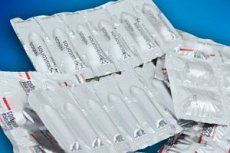
Suppositories are considered a very popular form of medicine, as they can quickly provide a positive therapeutic result. They do not have such a long list of contraindications as tablets or injection solutions. Most often, rectal anti-inflammatory suppositories are used to treat various diseases of the reproductive system and intestines. They are no less effective in the treatment of diseases of the genitourinary system.
Candles, or as they are also called suppositories, have a cone shape. At room temperature, they are able to maintain their shape, but after increasing the temperature, they begin to melt immediately. Thanks to this, a sufficient amount of the active substance enters the patient's body.
What are the benefits of suppositories?
- Fast action – already 30 minutes after the rectal suppository is taken, 50% of the active component of the drug is detected in the patient’s blood, and after an hour this amount increases to 100%. In this case, the active substances bypass the liver and enter directly into the rectum.
- They do not create any discomfort for the patient.
Indications rectal anti-inflammatory suppositories
The most popular in medicine are anti-inflammatory suppositories with wound-healing and thrombotic effects. They are used to treat a wide variety of diseases:
- Fissures in the rectum.
- Haemorrhoids.
- Colpitis.
- Inflammatory processes in the intestine, including Crohn's disease, ulcerative colitis.
- Endometritis.
- Adnexitis.
- Inflammation of other organs of the reproductive system.
 [ 5 ]
[ 5 ]
Release form
Today, you can find a huge number of various rectal suppositories with anti-inflammatory effect in pharmacies. All of them are used to treat various diseases and are based on the action of various active components. It is worth understanding that for effective treatment, you must strictly adhere to the advice that your doctor gave you in the instructions for the drug. Among the most popular rectal suppositories with anti-inflammatory effect, it is worth highlighting:
- Voltaren.
- Diclofenac.
- Flamax.
- Movalis.
- Hexicon.
- Polygynax.
- Meratin-Combi.
- Mycogynax.
- Proctozan.
- Neo-Anuzol.
- Anusol.
- Procto-Glivenol.
The use of rectal anti-inflammatory suppositories in gynecology
Rectal suppositories with anti-inflammatory action are usually used to treat various inflammatory processes of the reproductive system, including adnexitis and endometritis. In addition, such suppositories have an analgesic and antipyretic effect. It should be remembered that in gynecology, rectal suppositories with anti-inflammatory action are usually only an addition to the main therapeutic course. Thanks to suppositories, the effect of other antibacterial drugs is enhanced and recovery occurs faster.
When treating various diseases of the female reproductive system, the following suppositories are most often used: Voltaren, Diclofenac, Flamax, Movalis.
Voltaren. A medicine based on the active component diclofenac sodium. This substance is part of the group of non-steroidal anti-inflammatory drugs that have analgesic, anti-inflammatory, antipyretic effects.
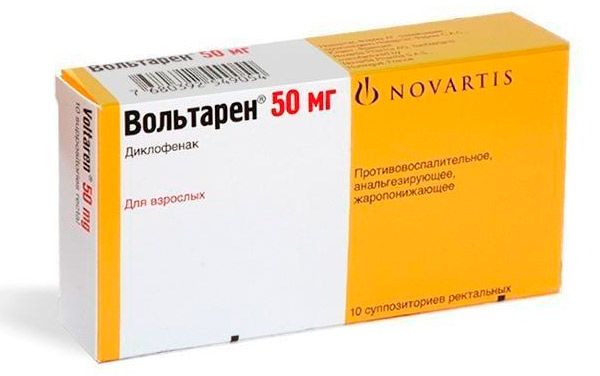
The dosage of the drug is determined by the attending physician, and, as a rule, the minimum effective dose is used to avoid the development of side effects. Suppositories are inserted directly into the rectum. It is recommended to use the product after emptying. The standard initial dose is considered to be up to 150 mg of the drug in 24 hours. It can be divided into two or three applications.
Voltaren is not recommended for proctitis, gastric ulcer, urticaria, bronchial asthma, acute rhinitis. It is also prohibited to use it to treat children under 18 years of age. It can cause thrombocytopenia, anaphylactic reaction, diplopia, depression, headaches, myocardial infarction, vasculitis.
Diclofenac. A medicine based on the active ingredient diclofenac sodium. It has moderate antipyretic, analgesic and anti-inflammatory effects.
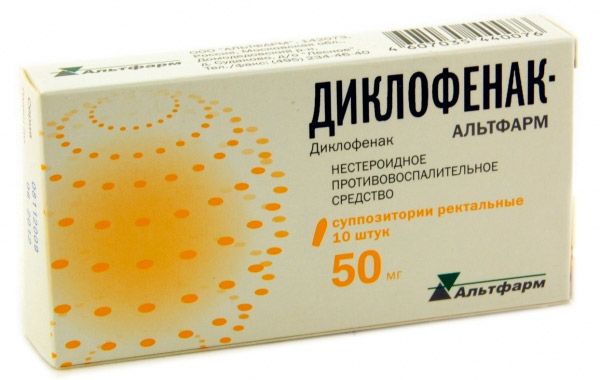
The following dosage is used for treatment: up to 50 mg of the drug is used no more than three times in 24 hours. It is not recommended to use Diclofenac for aspirin triad, stomach ulcer, hematopoiesis disorder. Use with caution for treatment of pregnant women.
Taking Diclofenac can cause diarrhea, vomiting, liver dysfunction, anemia, hair loss, paresthesia, swelling, allergies, photosensitivity, headaches.
Flamax. A medicine based on the active component ketoprofen. A non-steroidal anti-inflammatory drug, which also has an antipyretic and analgesic effect. Inflammation is usually relieved one week after the start of therapy.
The dosage is determined by the attending physician depending on the patient's condition and the severity of the disease. The standard dose is as follows: 100-200 mg of the drug should be divided into several doses per day. This remedy can be combined with other drugs to achieve an effective result.
Flamax is not recommended for use in patients with rhinitis, bronchial asthma, gastric ulcer, Crohn's disease, diverticulitis, hemophilia, peptic ulcer, kidney disease, hyperkalemia. Pregnant women and children under 6 years of age should also not take the drug. It can cause allergies, dyspepsia, stomatitis, headaches, insomnia, vertigo, conjunctivitis, myalgia, exfoliative dermatitis.
Movalis. A medicine based on the active component meloxicam. This substance is a derivative of enolic acid, therefore it has an antipyretic, anti-inflammatory and analgesic effect.
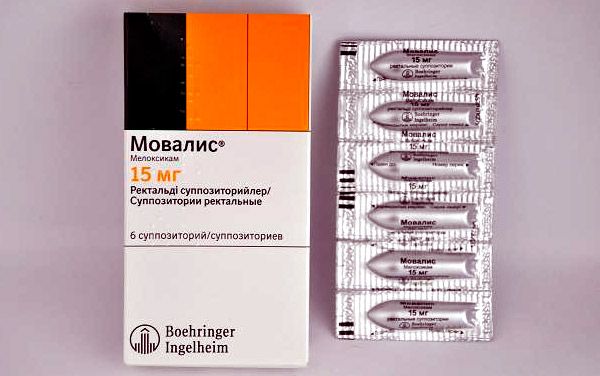
Movalis suppositories are usually used at 7.5 mg of the drug once every 24 hours. If the patient's condition is more severe, the dosage may be increased to 15 mg. To avoid the development of side effects from the use of suppositories, it is recommended to take the minimum effective dose.
The drug should not be used in case of stomach ulcer, Crohn's disease, acute and chronic liver diseases, bronchial asthma, stomach bleeding, hyperkalemia, pregnancy. Taking Movalis can cause nausea, gastritis, colitis, hepatitis, leukopenia, thrombocytopenia, bronchospasm, photosensitivity, headaches, kidney dysfunction.
 [ 6 ], [ 7 ], [ 8 ], [ 9 ], [ 10 ]
[ 6 ], [ 7 ], [ 8 ], [ 9 ], [ 10 ]
Anti-inflammatory rectal suppositories for the intestines
Rectal suppositories with an antibacterial effect are often used to treat intestinal diseases, in particular colitis. Thanks to them, you can quickly destroy the pathogens that caused the disease. The most popular suppositories with an anti-inflammatory effect for the treatment of inflammatory bowel diseases are: Hexicon, Polygynax, Meratin-Combi, Mikozhinax.
Hexicon. A medicine based on the active component chlorhexidine bigluconate. It has an antibacterial effect on gram-positive and gram-negative microorganisms (Neisseria gonorrhoeae, Treponema pallidum, Gardnerella vaginalis, Chlamydia spp., Ureaplasma spp).
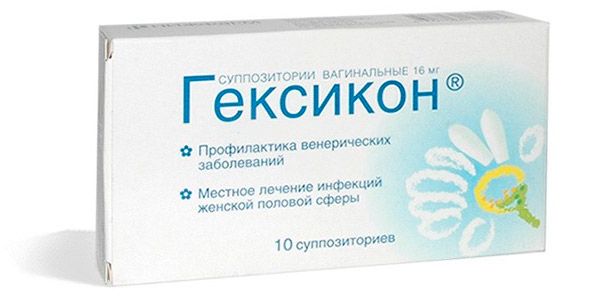
The dosage of Hexicon depends on the patient's condition, so it is determined exclusively by the attending physician. In addition, the dosage and duration of therapy also depend on the disease itself.
Doctors do not recommend using the product for dermatitis and allergies, and Hexicon should also be used with caution for treating children. Taking this drug can cause itching, allergies, dermatitis, photosensitivity, and taste disturbances.
Polygynax. A medicine based on the active components of polymyxin B sulfate, neomycin sulfate, nystanin. It is an effective antibacterial agent that is active in the fight against: Corynebacterium spp., Staphylococcus aureus, Escherichia coli, Proteus vulgaris, Ureaplasma urealyticum.
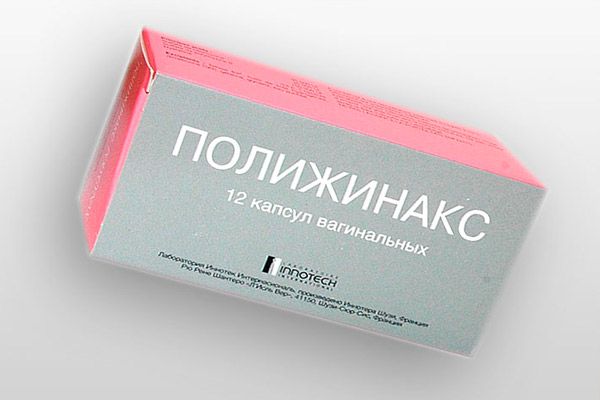
The dosage of the drug is individual, so it is determined by the attending physician. In addition to intestinal inflammation, Polygynax is also used to treat vaginal infections in women. Therapy lasts up to twelve days. It can be used as a preventive measure (6 days).
There are no special contraindications for the use of these suppositories, but their use may cause allergies.
Meratin-Combi. A medicine based on the active components nystatin, ornidazole, prednisolone and neomycin sulfate.
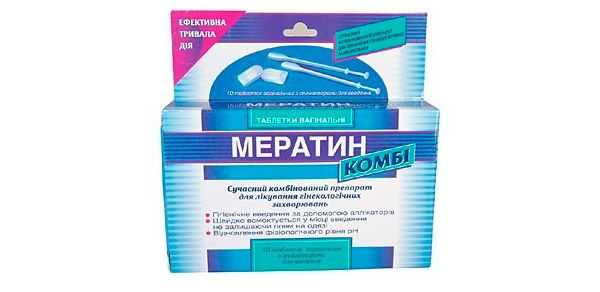
It is recommended to inject deeply enough once every 24 hours (preferably at night). After the injection, it is worth lying down for a while (at least fifteen minutes). On average, the therapy lasts about ten days.
There are no contraindications to the use of the drug, but it should be taken into account that Meratin-Combi in some cases can cause allergic reactions or irritations.
Mikozhinaks. A medicine based on the active components nystatin, chloramphenicol, metronidazole, dexamethasone acetate.
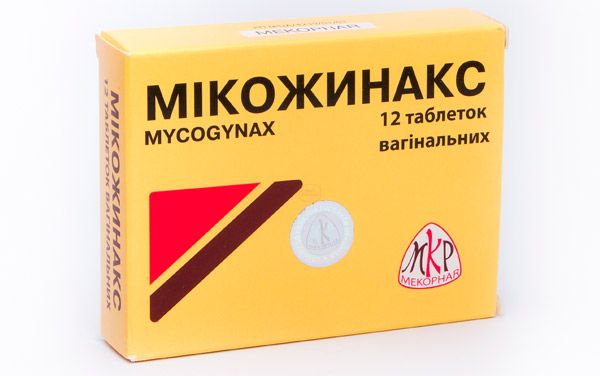
The standard dosage of the drug is as follows: one suppository is administered once a day. The duration of therapy is determined by a specialist, but it should not exceed ten days.
Absolute contraindications to the use of these suppositories are the following diseases: lactation, treatment of pregnant women, allergy to any of the components of the drug, treatment of children.
Mycogynax may cause diarrhea, inflammation of the oral cavity, hepatitis, pancreatitis, encephalopathy, agranulocytosis, pustular rash, nystagmus, diplopia, headaches.
Anti-inflammatory rectal suppositories in proctology
The most common disease for which rectal suppositories with anti-inflammatory effect are used is hemorrhoids. They are usually made using synthetic and natural components. The most popular herbal components are: calendula, propolis, sea buckthorn oil. Among the effective suppositories in proctology, the following should be highlighted: Proctozan, Neo-Anuzol, Anuzol and Procto-Glivenol.
Proctozan. A medicine based on the active components of titanium dioxide, bufexamak, lidocaine hydrochloride monohydrate, bismuth subgallate. It has astringent, anesthetic, anti-inflammatory, drying effects.
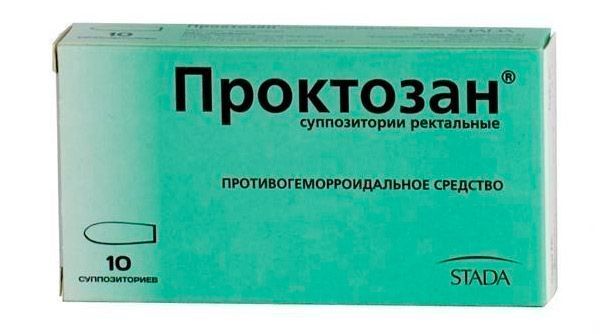
The dosage of suppositories is as follows: one suppository is inserted deep enough into the anus up to two times per 24 hours. It is very important to insert the drug after the intestines have been emptied. The therapy continues for up to ten days, there is no need to stop the treatment after the disappearance of visible symptoms of the disease and improvement of the general condition.
Proctozan is not recommended for tuberculosis or syphilis. You should not treat hemorrhoids with these tablets during pregnancy or breastfeeding. Do not use for therapy of children. Taking Proctozan can cause allergies, itching, burning.
Neo-Anuzol. A medicine based on the active components tannin, bismuth nitrate, resorcinol, zinc oxide, iodine, methylthioninium chloride. It has an astringent and antiseptic effect.
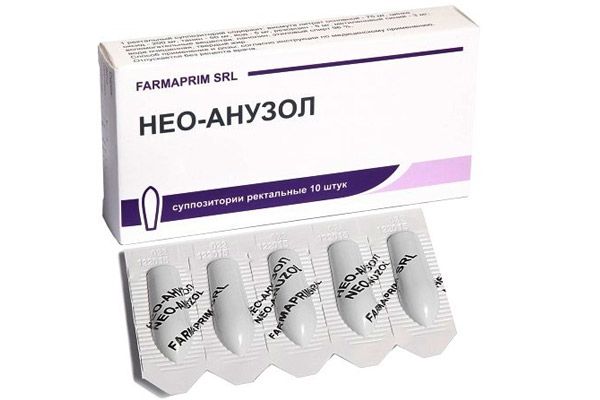
The standard dosage is one suppository once or twice a day. There are practically no contraindications to the use of the product, but it is worth noting that Neo-Anuzol can cause allergies.
Anuzol. A medicine based on the active components zinc sulfate, bismuth tribromophenate, thick extract of belladonna. It has antiseptic, anti-inflammatory, analgesic, astringent, antispasmodic, drying effects.
The standard dosage is one suppository no more than twice a day. It is worth noting that you cannot use more than seven suppositories per day (only as prescribed by a specialist).
Anuzol is not recommended for use in tachyarrhythmia, intestinal atony, closed-angle glaucoma, myasthenia, prostate adenoma. It should not be used to treat children, pregnant women, women during lactation. It may cause loose stools, headaches, dry mouth, constipation, increased heart rate.
Procto-Glivenol. A medicine based on the active components lidocaine and tribenoside. Quite quickly relieves the main symptoms of hemorrhoids.
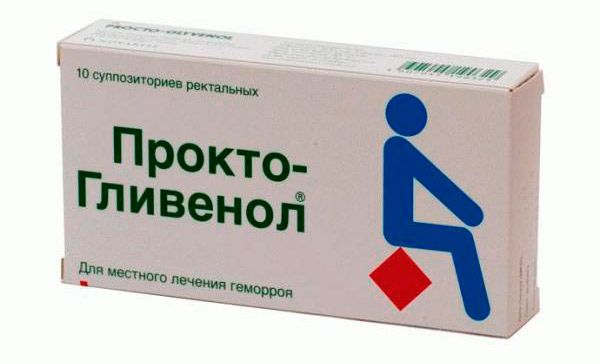
The standard dosage is one suppository twice in 24 hours (preferably in the morning and evening). When symptoms regress, it can be used once a day. It is not recommended for use in pregnant women and children. It should not be taken if you have liver disease.
Procto-Glivenol may cause the development of allergic reactions, bronchospasm, anaphylactic reactions, swelling, and skin irritation.
Let us consider the pharmacodynamics and pharmacokinetics of rectal anti-inflammatory suppositories based on the drug "Procto-Glivenol".
Pharmacodynamics
This remedy is considered a combination drug for the treatment of hemorrhoids. Tribenoside, which is part of the suppositories, helps improve vascular tone and capillary permeability. It also acts antagonistically on endogenous substances that participate in the occurrence of pain and the development of inflammation.
With the help of the second active component, lidocaine, Procto-Glivenol has an anesthetic effect.
Overdose
Sometimes an overdose of rectal anti-inflammatory suppositories is possible, in which the patient develops constipation or diarrhea. Symptomatic therapy is used to improve the condition. The use of the drug is discontinued.
 [ 23 ]
[ 23 ]
Attention!
To simplify the perception of information, this instruction for use of the drug "Rectal anti-inflammatory suppositories" translated and presented in a special form on the basis of the official instructions for medical use of the drug. Before use read the annotation that came directly to medicines.
Description provided for informational purposes and is not a guide to self-healing. The need for this drug, the purpose of the treatment regimen, methods and dose of the drug is determined solely by the attending physician. Self-medication is dangerous for your health.

